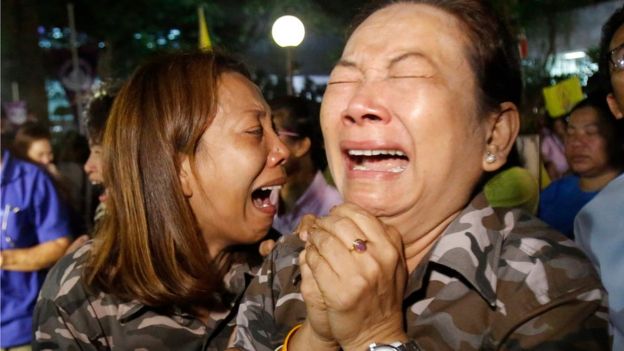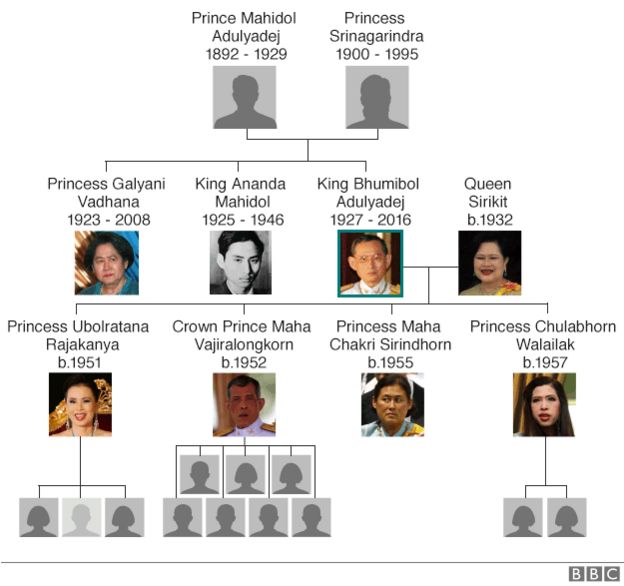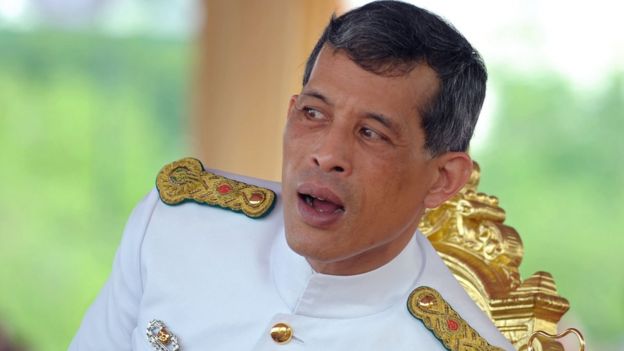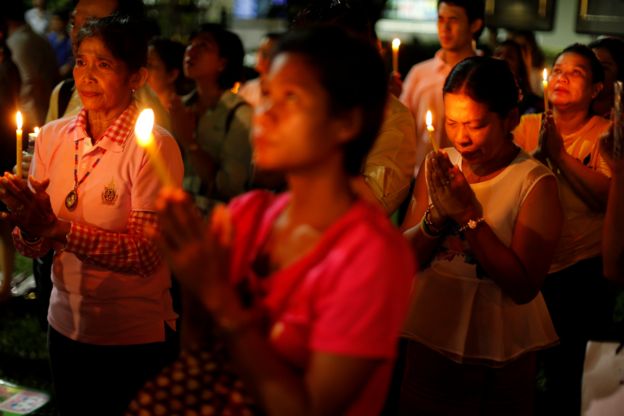Thailand's King Bhumibol Adulyadej dead at 88
8 minutes ago, October 13, 2016, http://www.bbc.com/news/world-asia-37643326
The 88-year-old king was widely revered but had been in poor health in recent years, making few public appearances.
He was seen as a stabilising figure in a country hit by cycles of political turmoil and multiple coups.
Crown Prince Maha Vajiralongkorn will be the new monarch, the prime minister has said.
The announcement
After two days of speculation and rumours surrounding the king's deteriorating health, the palace announcement confirming his death finally came early on Thursday evening.
"His majesty has passed away at Siriraj Hospital peacefully," a statement said, adding he had died at 15:52 (08:52 GMT).
 Crowds outside the hospital howled with grief when the announcement was made
Crowds outside the hospital howled with grief when the announcement was made
In a televised address to the nation, Prime Minister Prayut Chan-ocha said Thailand would hold a one-year mourning period, that flags would fly half-mast and all entertainment functions must be "toned down" for a month.
In a later statement he urged vigilance, saying national security was a top priority.
"Everyone will need to be alert in every region and throughout the country to ensure safety", he said.
The king's death comes as Thailand remains under military rule following a coup in 2014.
A palace official, speaking to crowds outside the hospital, said the body of the king would be moved to the Temple of the Emerald Buddha in Bangkok on Friday.
The people's grief
King Bhumibol was widely respected across Thailand, and thought of by many as semi-divine.
Hundreds of mourners gathered outside the Bangkok hospital where he died, stricken with grief at the news.
Many held pictures of the king and wore yellow or pink clothing in his honour.
"How will Thailand live without you father?" cried one distressed man.
"I lost one of the most important people in my life. I feel like I haven't done enough for him," said another.
A wave of emotion swept through the crowd - Jonah Fisher, BBC News, Bangkok
Throughout the first part of the day the king's supporters had sung royal songs and recited prayers at Siriraj Hospital. Many wore carefully chosen colours. Pink, for good health, or yellow the royal colour.
Most knelt holding pictures of King Bhumibol, facing the part of the hospital where he was receiving treatment.
By early afternoon the mood had begun to change. With all of his children at his bedside, rumours were circulating that the 88-year-old had passed away.
The tears began to flow, and in between songs the call of "God Save the King" was shouted with an almost visceral desperation.
Then just before 19:00 local time, the news was official. A wave of emotion swept through the crowd. Many clung to each other and wept.
Thailand's father figure, a beacon of stability in a divided and worried country, had died. A new, more uncertain era has begun.
The succession
Although the prime minister said Crown Prince Maha Vajiralongkorn would become the new monarch, he added that the official proclamation would be made at a later date.
He said the crown prince had confirmed that he would perform his duty as heir to the throne, but had asked for time to mourn his father's death.
The crown prince, who is 64, is much less well known to Thais and has not attained his father's widespread popularity. He spends much of his time overseas, especially in Germany.
Strict lese-majeste laws protect the most senior members of Thailand's royal family from insult or threat. Public discussion of the succession can be punishable by lengthy jail terms.
Given the pivotal role the king has played in maintaining the balance of power in Thailand's volatile political environment, the succession will be a formidable challenge for the government, says the BBC's Jonathan Head in Bangkok.
The king's legacy
King Bhumibol, who was born in Cambridge in the US state of Massachusetts, acceded to the throne on 9 June 1946 after his brother, King Ananda Mahidol, died.
Though a constitutional monarch with limited official powers, many Thais looked to King Bhumibol to him to intervene in times of high tension. He was seen as a unifying and calming influence through numerous coups and 20 constitutions.
However, his critics argued he had endorsed military takeovers and at times had failed to speak out against human rights abuses.
Following the death of King Bhumibol, Britain's Queen Elizabeth II has become the world longest-reigning monarch, having been on the throne for 64 years.
The tributesTributes have been flowing in from across the world.
US President Barack Obama called the late king a "tireless champion of his country's development".
"I had the honour of calling on his majesty the king during my visit to Thailand in 2012, and recall his grace and warmth, as well as his deep affection and compassion for the Thai people," he said.
UN Secretary General Ban Ki-Moon said in a statement that he hoped Thailand would honour King Bhumibol's legacy of commitment to universal values and respect for human rights.
Asian leaders were quick to express their condolences. Indian Prime Minister Narendra Modi described the late king as "one of the tallest leaders of our times".


 Most ordinary Thais know only a few details about Crown Prince Vajiralongkorn
Most ordinary Thais know only a few details about Crown Prince Vajiralongkorn As night fell, crowds of mourners remained at the hospital where the King died
As night fell, crowds of mourners remained at the hospital where the King died A wave of emotion swept through the crowd - Jonah Fisher, BBC News, Bangkok
A wave of emotion swept through the crowd - Jonah Fisher, BBC News, Bangkok